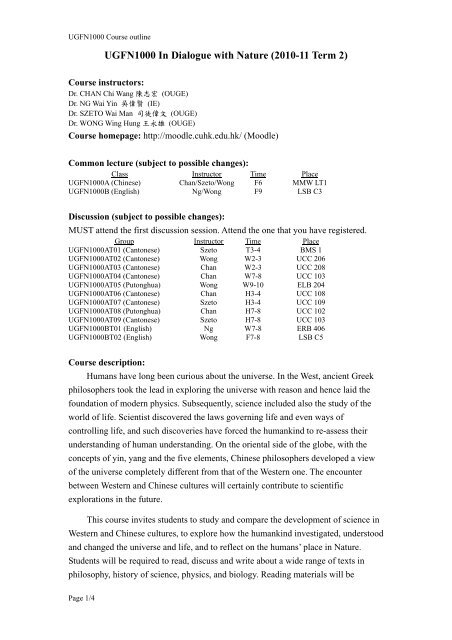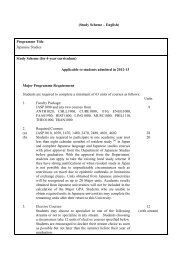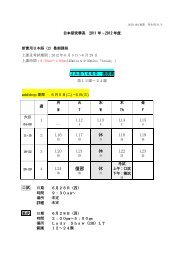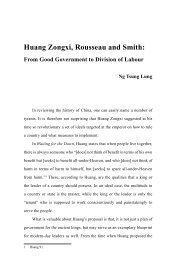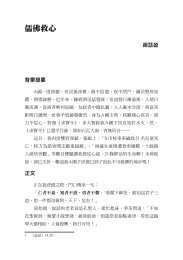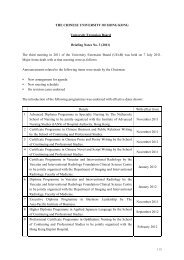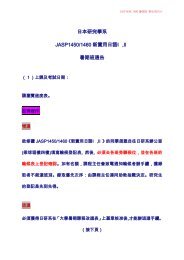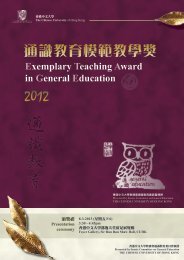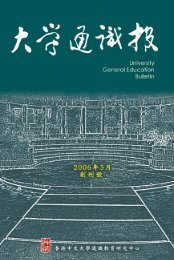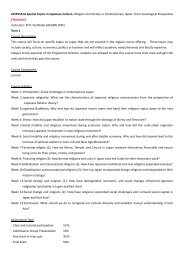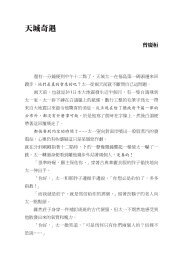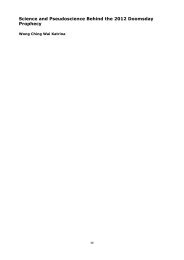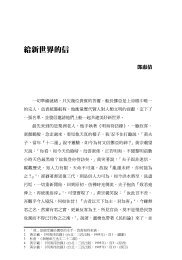UGFN1000 In Dialogue with Nature (2010-11 Term 2)
UGFN1000 In Dialogue with Nature (2010-11 Term 2)
UGFN1000 In Dialogue with Nature (2010-11 Term 2)
- No tags were found...
Create successful ePaper yourself
Turn your PDF publications into a flip-book with our unique Google optimized e-Paper software.
<strong>UGFN1000</strong> Course outline<strong>UGFN1000</strong> <strong>In</strong> <strong>Dialogue</strong> <strong>with</strong> <strong>Nature</strong> (<strong>2010</strong>-<strong>11</strong> <strong>Term</strong> 2)Course instructors:Dr. CHAN Chi Wang 陳 志 宏 (OUGE)Dr. NG Wai Yin 吳 偉 賢 (IE)Dr. SZETO Wai Man 司 徒 偉 文 (OUGE)Dr. WONG Wing Hung 王 永 雄 (OUGE)Course homepage: http://moodle.cuhk.edu.hk/ (Moodle)Common lecture (subject to possible changes):Class <strong>In</strong>structor Time Place<strong>UGFN1000</strong>A (Chinese) Chan/Szeto/Wong F6 MMW LT1<strong>UGFN1000</strong>B (English) Ng/Wong F9 LSB C3Discussion (subject to possible changes):MUST attend the first discussion session. Attend the one that you have registered.Group <strong>In</strong>structor Time Place<strong>UGFN1000</strong>AT01 (Cantonese) Szeto T3-4 BMS 1<strong>UGFN1000</strong>AT02 (Cantonese) Wong W2-3 UCC 206<strong>UGFN1000</strong>AT03 (Cantonese) Chan W2-3 UCC 208<strong>UGFN1000</strong>AT04 (Cantonese) Chan W7-8 UCC 103<strong>UGFN1000</strong>AT05 (Putonghua) Wong W9-10 ELB 204<strong>UGFN1000</strong>AT06 (Cantonese) Chan H3-4 UCC 108<strong>UGFN1000</strong>AT07 (Cantonese) Szeto H3-4 UCC 109<strong>UGFN1000</strong>AT08 (Putonghua) Chan H7-8 UCC 102<strong>UGFN1000</strong>AT09 (Cantonese) Szeto H7-8 UCC 103<strong>UGFN1000</strong>BT01 (English) Ng W7-8 ERB 406<strong>UGFN1000</strong>BT02 (English) Wong F7-8 LSB C5Course description:Humans have long been curious about the universe. <strong>In</strong> the West, ancient Greekphilosophers took the lead in exploring the universe <strong>with</strong> reason and hence laid thefoundation of modern physics. Subsequently, science included also the study of theworld of life. Scientist discovered the laws governing life and even ways ofcontrolling life, and such discoveries have forced the humankind to re-assess theirunderstanding of human understanding. On the oriental side of the globe, <strong>with</strong> theconcepts of yin, yang and the five elements, Chinese philosophers developed a viewof the universe completely different from that of the Western one. The encounterbetween Western and Chinese cultures will certainly contribute to scientificexplorations in the future.This course invites students to study and compare the development of science inWestern and Chinese cultures, to explore how the humankind investigated, understoodand changed the universe and life, and to reflect on the humans’ place in <strong>Nature</strong>.Students will be required to read, discuss and write about a wide range of texts inphilosophy, history of science, physics, and biology. Reading materials will bePage 1/4
<strong>UGFN1000</strong> Course outlineselected from influential classics. Emphasis will be placed on students’ capacity torespond critically to these texts in written as well as oral presentations. Class size willbe kept small to maximize discussions and to facilitate intensive guidance onacademic writing, in Chinese and/or English as specified by the instructor.Course book: All core readings listed below are reserved in the University Library.One must observe the guidelines for compliance <strong>with</strong> the Copyright Laws whenmaking photocopies. To prevent breaking the law, you should buy a course book thatcontains all the core readings. The course book could be purchased from the areaoutside the office of Leadership Development Programme [G/F, Hui Yeung ShingBuilding, 10:00-14:30, Jan <strong>11</strong>-14 (T-F) and Jan 17-19 (M-W)] at HK$160.Course content and core readings:The course is composed of 3 parts, each of which consists of several issues.Students have to read the core readings related to the issue before attending thediscussion session. All readings are reserved at the University Library.Part 1. Human Exploration of the Physical UniverseCore questions/issues Texts Core readingsWhat is truth?Plato, Republic / translated from the newstandard Greek text, <strong>with</strong> introduction byC.D.C. Reeve (<strong>In</strong>dianapolis: HackettPublishing, 2004).Book VII (Verses514-521c)How to find andexpress scientific truth?(Physical science fromAristotle to Galileo)How to find andexpress scientific truth?(Physical science sinceNewton)What truth about theuniverse do we know?(Expansion of theuniverse)Page 2/4Grant, Physical Science in the Middle Ages(New York: John Wiley & Sons, 1971).Roy Porter (ed), The Cambridge History ofScience, Vol. 4 (Eighteenth-Century Science)(Cambridge: Cambridge University Press,2003)ANDStephen Hawking (ed), On the Shoulders ofGiants (London: Penguin, 2003).Steven Weinberg, The First Three Minutes: AModern View of the Origin of the Universe(New York: Basic Books, 1993).Chapter 4Chapter 15 of TheCambridge History ofScienceANDDefinitions I-VIII ofNewton’s TheMathematicalPrinciples of NaturalPhilosophyChapter 2 (Paragraphs1-40)Part 2. Human Exploration of the World of LifeCore questions/issues Texts Core readingsWhat are the laws oflife? (Natural selection)Charles Darwin, The Origin of Species. Chapter 4 (Paragraphs1-23, 45-86)What is the code oflife? (The discovery ofDNA)James D. Watson, DNA: The Secret of Life(New York: Alfred A. Knopf, 2003).Chapter 1 (Paragraphs1-36), Chapter 2.What impacts doesmanipulation of lifebring?Rachel Carson, Silent Spring (Boston:Houghton Mifflin, 1962).Chapter 6
<strong>UGFN1000</strong> Course outlinePart 3. Our Understanding of Human UnderstandingCore questions/issues Texts Core readingsWhat are the limit ofscientific method andmathematics?Henri Poincaré, The Value of Science:Essential Writings of Henri Poincaré (NewYork: Modern Library, 2001).Henri Poincaré, Science and Method (London:Chapter 1Chapter 3What is human mind?What do Chinese knowabout <strong>Nature</strong>? (Yin,Yang and five elements)Western culture versusChinese cultureRoutledge/Thoemmes, 1996).Mind and Matter in Erwin Schrödinger, Whatis Life? <strong>with</strong> Mind and Matter andAutobiographical Sketches. Cambridge:Cambridge University Press, 2004.Joseph Needham, The Shorter Science andCivilisation in China Vol. 1. Cambridge:Cambridge University Press, 1978.Joseph Needham, Science and Civilisation inChina Vol. 7. Cambridge: CambridgeUniversity Press, 2004.Chapter 1, Chapter 2(Paragraphs 1-3,21-26), Chapter 3 andChapter 4 (Paragraphs<strong>11</strong>-14) of Mind andMatter.Chapter 10ConclusionsWhat do Chinese knowabout <strong>Nature</strong>?熊 公 哲 :《 荀 子 今 註 今 譯 》( 臺 北 : 臺 灣 商 務印 書 館 ,1984)。勸 學 篇 、 解 蔽 篇 、 天 論篇Expected learning outcomes:1. An enhanced understanding of past developments in and the present condition ofnatural science.2. Formulation of a personal perspective on the direction and ethics of futurescientific explorations.3. Ability to read classics in natural science independently and critically.4. Improved confidence and ability to engage in academic discussions.5. <strong>In</strong>itiation into the world of natural science.<strong>In</strong>dependent Learning Centre (ILC) at CUHK (http://www.ilc.cuhk.edu.hk/)The ILC provides a resourceful environment for students to improve their learningand enhance their language proficiency. <strong>In</strong> particular, they support students in criticalreading/discussion and writing in GE courses. Please refer tohttp://www.ilc.cuhk.edu.hk/english/generaledu.asp for more details.Page 3/4
<strong>UGFN1000</strong> Course outlineTentative schedule: See Moodle for updates.Week Discussion Lecture1 About the course. Plato (I)2 (Q); Plato (D) Grant (I)3 Grant (D) Grant (I)4-5 (Q); Grant (D) Cambridge (I)6 (Q); Cambridge (D) Weinberg (I)k The kth reading (D). The kth reading (I)(Q): Quiz; (D): Discussion; (I): <strong>In</strong>troductionNote: <strong>In</strong> case of clashes <strong>with</strong> public holidays, please refer to Moodle forannouncement on class arrangement.Assessment scheme:Open-text quizzes (the highest 2 out of 3) 10%1-page pre-discussion sharing (the highest 3 out of 4) 25%50/40-word pre-discussion sharing (the highest 3 out of 4) (Chinese: 50 25%words; English: 40 words)1 term paper (Chinese: 1600-1900 words; English: 1250-1500 words) 30%(instructions will be provided)Participation in discussion 10%Note: Zero mark will be given for late submission.VeriGuideThe Senate Committee on Teaching and Learning decided that all student assignmentsin undergraduate and postgraduate programmes should be submitted via VeriGuide(http://www.cuhk.edu.hk/veriguide). This applies to assignments in the form of acomputer-generated document that is principally text-based (i.e., excludingcalculations in science, brief laboratory reports, drawings in fine arts and architecture,etc.)Academic honesty and plagiarismAttention is drawn to University policy and regulations on honesty in academic work,and to the disciplinary guidelines and procedures applicable to breaches of suchpolicy and regulations. Details can be found athttp://www.cuhk.edu.hk/policy/academichonesty/— End —Page 4/4


